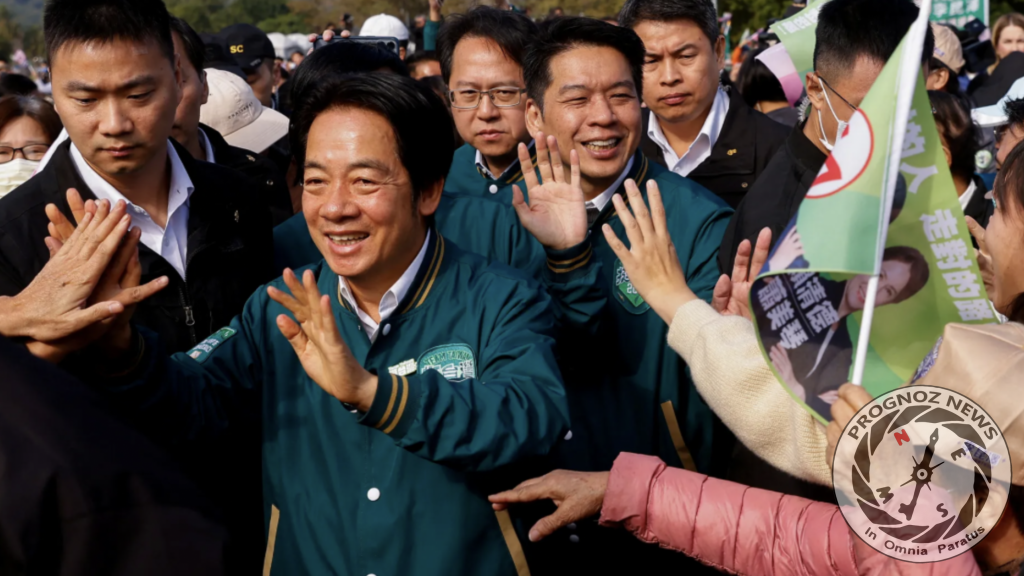𝐔.𝐒.-𝐂𝐡𝐢𝐧𝐚 𝐭𝐞𝐧𝐬𝐢𝐨𝐧𝐬 𝐰𝐢𝐥𝐥 𝐫𝐢𝐬𝐞 𝐚𝐟𝐭𝐞𝐫 𝐭𝐡𝐞 𝐃𝐞𝐦𝐨𝐜𝐫𝐚𝐭𝐢𝐜 𝐏𝐫𝐨𝐠𝐫𝐞𝐬𝐬𝐢𝐯𝐞 𝐏𝐚𝐫𝐭𝐲 𝐰𝐢𝐧𝐬 𝐚𝐧𝐨𝐭𝐡𝐞𝐫 𝐭𝐞𝐫𝐦 𝐢𝐧 𝐨𝐟𝐟𝐢𝐜𝐞 𝐢𝐧 𝐓𝐚𝐢𝐰𝐚𝐧.
 Taiwan’s next president, Lai Ching-te, was elected from the Democratic Progressive Party (DPP), a historic first for the country. The election has both immediate and long-term consequences for Taiwan’s ties with China, which is becoming increasingly hostile. The vote is expected to enrage Beijing, which had advised Taiwan against electing Lai. However, questions remain about what comes next for cross-strait ties and what the US must do to keep tensions from escalating.
Taiwan’s next president, Lai Ching-te, was elected from the Democratic Progressive Party (DPP), a historic first for the country. The election has both immediate and long-term consequences for Taiwan’s ties with China, which is becoming increasingly hostile. The vote is expected to enrage Beijing, which had advised Taiwan against electing Lai. However, questions remain about what comes next for cross-strait ties and what the US must do to keep tensions from escalating.
According to Bloomberg surveys, Lai won the election with more than 5.5 million votes, or 40.1%, just under a million more than the other major political party candidate, Kuomintang’s Hou You-ih, who garnered 4.6 million, or 33.5%. Third-party candidate Ko Wen-je of the Taiwan People’s Party earned more than 3.6 million votes, or 26.5%.
The 2024 election comes at a challenging time for Taiwan, which must try to maintain its status quo and enjoy a semblance of autonomy in the face of increasingly hostile Chinese military activities and messaging. While many still believe that an invasion of Taiwan is unlikely in the immediate future, concerns about various ways China could strangle the island remain.
Tsai’s presidency has been marked by needing to tread carefully when it comes to engaging in discussion with Beijing, with rapid economic and trade sanctions imposed when her rhetoric falls short of expectations. Since then, China has frequently attacked Tsai and the DPP, and Lai has received a lot of flak.
The expansion of military drills is the primary instrument of Chinese pressure, although an invasion of Taiwan’s southern islands is a remote possibility; this would hasten the military buildup in the region. The likelihood of Chinese military exercises near Taiwan in the weeks after the election, during Lai’s inauguration in May, and during any possible island visits by American politicians before the November U.S. elections is moderate. In the four years that the DPP will be in power, China will increase the frequency and severity of naval exercises near Taiwan and its incursions into Taiwan’s unofficial airspace, among other military coercive techniques.
Key global electronics flows will most likely remain unaffected, but China will increase its economic pressure on Taiwan with a comparable low likelihood of drastic steps. Following Lai’s victory, China is expected to further suspend tariff exemptions on Taiwanese exports under the Economic Cooperation Framework Agreement (ECFA). As a result, the Taiwanese government will likely look for alternative markets to sell their agricultural and industrial products.
U.S.-China reengagement attempts will be hindered by Lai’s administration’s increasing economic and military pressure on Taiwan. Coercive measures like these will be seen by Washington as more proof that China poses a threat to American national security interests, especially the stability of U.S. trade over the Taiwan Strait and naval supremacy in the western Pacific.
@prognoz_news
134 Views










